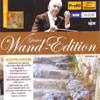Haydn Piano Concerto in D Major; Oboe Concerto; Symphony No 76
Big band Haydn from Wand is serious but never heavy-handed
View record and artist detailsRecord and Artist Details
Composer or Director: Joseph Haydn
Genre:
Orchestral
Label: Profil
Magazine Review Date: 4/2007
Media Format: CD or Download
Media Runtime: 59
Mastering:
Stereo
DDD
ADD
Catalogue Number: PH05045

Tracks:
| Composition | Artist Credit |
|---|---|
| Concerto for Keyboard and Orchestra |
Joseph Haydn, Composer
Günter Wand, Conductor Hamburg NDR Orchestra Joseph Haydn, Composer Nikita Magaloff, Piano |
| Concerto for Oboe and Orchestra |
Joseph Haydn, Composer
Cologne Radio Symphony Orchestra Günter Wand, Conductor Hansjörg Schellenberger, Oboe Joseph Haydn, Composer |
| Symphony No. 76 |
Joseph Haydn, Composer
Cologne Radio Symphony Orchestra Günter Wand, Conductor Joseph Haydn, Composer |
Author: Nalen Anthoni
Not a period instrument to be heard, the band is big: brass and timpani in the Oboe Concerto don’t stand out as assertively as would be expected today. Günter Wand is a musician of his time but his direction isn’t heavy or laboured. Though this work is not by Haydn (Georg Feder considers it spurious, Robbins Landon says it was assembled by Eusebius Mandyczewski from orchestral parts that had the composer’s name in a dubious hand), Wand is most attentive to requirements. And Hansjörg Schellenberger is a superlative soloist, subtly shading his tone and affectionately phrasing his contribution from over-long first movement to trite finale.
Nikita Magaloff is not always as involving in the Keyboard Concerto. He is responsive to its character, especially in the slow movement, yet seems ill at ease with the sober pacing of the outer movements, fluidly mobile though they are. Wand isn’t given to frippery, either here or in Symphony No 76, the first in a trilogy for a prospective London trip c1782 that didn’t happen. Haydn described the work (indeed all three) as “beautiful and elegant” but, with the exception of the Minuet and Trio, Wand doesn’t agree. His is a predominantly serious view of the music, dark in texture, hauntingly grave in the B flat minor section of the slow movement, vehemently agitated in its succeeding G minor episode.
All the recordings are good for their respective ages, and there is no impediment to listening to these substantial interpretations. They demand study and assimilation.
Nikita Magaloff is not always as involving in the Keyboard Concerto. He is responsive to its character, especially in the slow movement, yet seems ill at ease with the sober pacing of the outer movements, fluidly mobile though they are. Wand isn’t given to frippery, either here or in Symphony No 76, the first in a trilogy for a prospective London trip c1782 that didn’t happen. Haydn described the work (indeed all three) as “beautiful and elegant” but, with the exception of the Minuet and Trio, Wand doesn’t agree. His is a predominantly serious view of the music, dark in texture, hauntingly grave in the B flat minor section of the slow movement, vehemently agitated in its succeeding G minor episode.
All the recordings are good for their respective ages, and there is no impediment to listening to these substantial interpretations. They demand study and assimilation.
Discover the world's largest classical music catalogue with Presto Music.

Gramophone Digital Club
- Digital Edition
- Digital Archive
- Reviews Database
- Full website access
From £8.75 / month
Subscribe
Gramophone Full Club
- Print Edition
- Digital Edition
- Digital Archive
- Reviews Database
- Full website access
From £11.00 / month
Subscribe
If you are a library, university or other organisation that would be interested in an institutional subscription to Gramophone please click here for further information.




